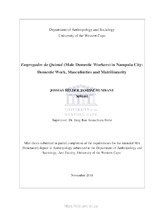| dc.contributor.advisor | Forte, Jung Ran Annachiara | |
| dc.contributor.author | Humbane, Jossias Helder Jamisse | |
| dc.date.accessioned | 2019-04-12T09:43:27Z | |
| dc.date.available | 2019-04-12T09:43:27Z | |
| dc.date.issued | 2018 | |
| dc.identifier.uri | http://hdl.handle.net/11394/6655 | |
| dc.description | Magister Artium - MA | en_US |
| dc.description.abstract | This study questions why domestic work that is generally considered a feminine job is yet a field dominated by men in the city of Nampula, Mozambique. In the attempt to explain this phenomenon, the research explores economic, social and cultural aspects. Due to the fact that Nampula is a province with a strong Islamic presence and the majority of the population identify themselves as belonging to the Makhuwa ethnic group—which is traditionally defined by a matrilinear kinship system—I argue that the domestic sector remaines masculinised because of the influence of the matrilinear values and gendered practices. I also argue that the Islamic patriarchal values play a decisive role as men see themselves as the exclusive family providers and for that reason forbid their wives to develop and to get engaged in economic activities outside the household. This study also explores notions of masculinity in connection with domestic work and examines how male domestic workers, coming from rural areas and employed in the city, perceive and perform their masculine identities. How does the job of the domestic worker shape particular understandings of masculinity? Given the fact that many domestic workers in Nampula are immigrant people from the rural areas of the Zambézia province, I argue that migrating and working in the city is considered as a way to achieve a manhood as immigrants have access to goods that can only be purchased in urban contexts and are scarce in the villages. The access to all these “modern” commodities and the experience of the city make the immigrant young boys to gain respect in their original communities. | en_US |
| dc.language.iso | en | en_US |
| dc.publisher | University of the Western Cape | en_US |
| dc.subject | Domestic work | en_US |
| dc.subject | Masculinities | en_US |
| dc.subject | Mozambique | en_US |
| dc.subject | Migration | en_US |
| dc.subject | Gender | en_US |
| dc.title | Empregados do Quintal (male domestic workers) in Nampula city: Domestic work, masculinities and matrilinearity | en_US |
| dc.rights.holder | University of the Western Cape | en_US |

